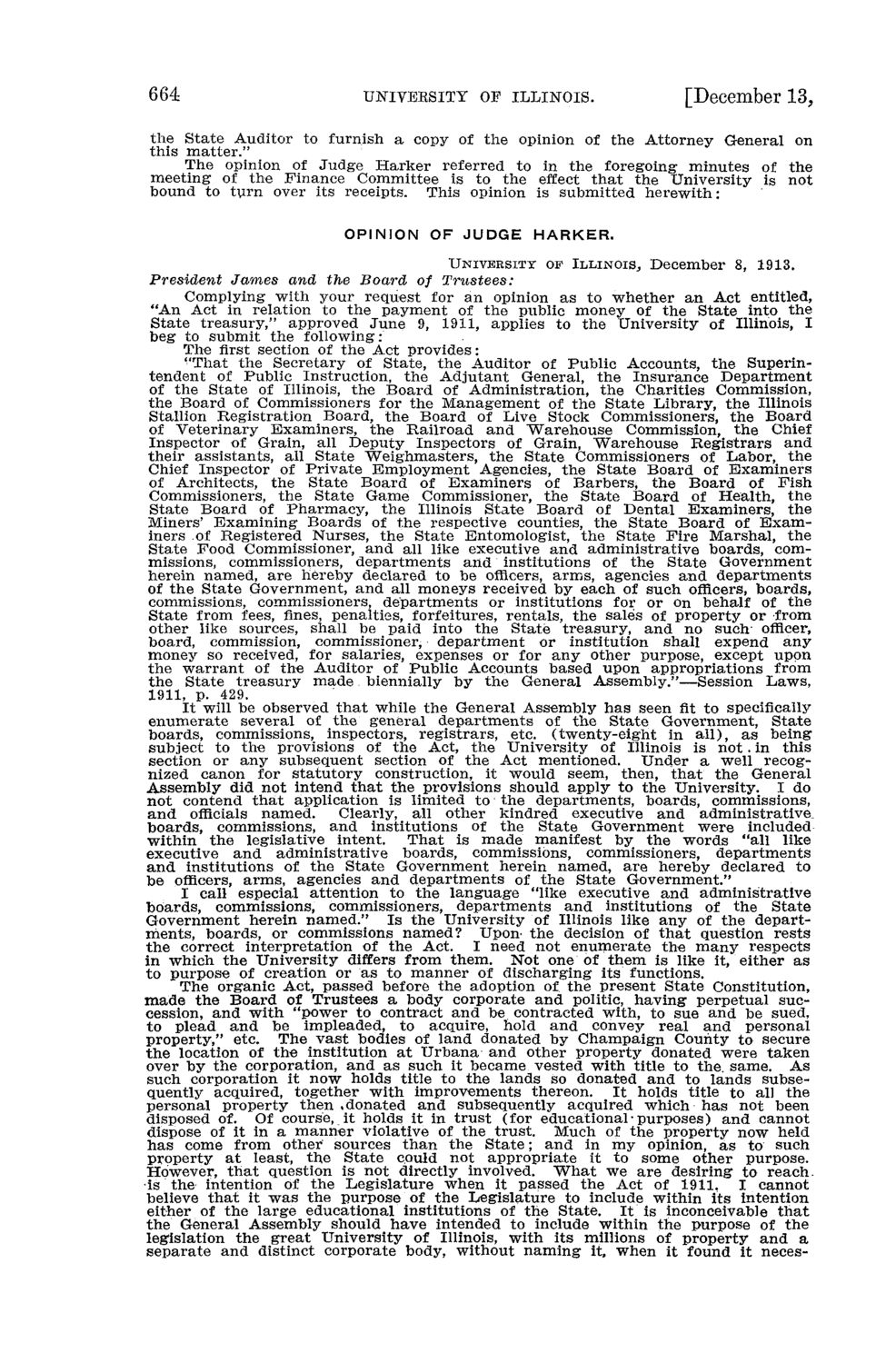| |
| |
Caption: Board of Trustees Minutes - 1914
This is a reduced-resolution page image for fast online browsing.

EXTRACTED TEXT FROM PAGE:
664: UNIVERSITY OF ILLINOIS. [December 13, the State Auditor to furnish a copy of the opinion of the Attorney General on this matter." The opinion of Judge Harker referred to in the foregoing minutes of the meeting of the Finance Committee is to the effect that the University is not bound to turn over its receipts. This opinion is submitted herewith: O P I N I O N OF JUDGE HARKER. 1913. UNIVERSITY OF ILLINOIS., December 8, President James and the Board of Trustees: Complying with your request for an opinion as to whether an Act entitled, "An Act in relation to the payment of the public money of the State into the State treasury," approved June 9, 1911, applies to the University of Illinois, I beg to submit the following: The first section of the Act provides: "That the Secretary of State, the Auditor of Public Accounts, the Superintendent of Public Instruction, the Adjutant General, the Insurance Department of the State of Illinois, the Board of Administration, the Charities Commission, the Board of Commissioners for the Management of the State Library, the Illinois Stallion Registration Board, the Board of Live Stock Commissioners, the Board of Veterinary Examiners, the Railroad and Warehouse Commission, the Chief Inspector of Grain, all Deputy Inspectors of Grain, "Warehouse Registrars and their assistants, all State Weighmasters, the State Commissioners of Labor, the Chief Inspector of Private Employment Agencies, the State Board of Examiners of Architects, the State Board of Examiners of Barbers, the Board of Fish Commissioners, the State Game Commissioner, the State Board of Health, the State Board of Pharmacy, the Illinois State Board of Dental Examiners, the Miners' Examining Boards of the respective counties, the State Board of Examiners of Registered Nurses, the State Entomologist, the State Fire Marshal, the State Food Commissioner, and all like executive and administrative boards, commissions, commissioners, departments and institutions of the State Government herein named, are hereby declared to be officers, arms, agencies and departments of the State Government, and all moneys received by each of such officers, boards, commissions, commissioners, departments or institutions for or on behalf of the State from fees, fines, penalties, forfeitures, rentals, the sales of property -or from other like sources, shall be paid into the State treasury, and no such officer, board, commission, commissioner, department or institution shall expend any money so received, for salaries, expenses or for any other purpose, except upon the warrant of the Auditor of Public Accounts based upon appropriations from the State treasury made. biennially by the General Assembly."—Session Laws, 1911, p. 429. It will be observed that while the General Assembly has seen fit to specifically enumerate several of the general departments of the State Government, State boards, commissions, inspectors, registrars, etc. (twenty-eight in all), as being subject to the provisions of the Act, the University of Illinois is not • in this section or any subsequent section of the Act mentioned. Under a well recognized canon for statutory construction, it would seem, then, that the General Assembly did not intend that the provisions should apply to the University. I do not contend that application is limited to the departments, boards, commissions, and officials named. Clearly, all other kindred executive and administrative, boards, commissions, and institutions of the State Government were included within the legislative intent. That is made manifest by; the words "all like executive and administrative boards, commissions, commissioners, departments and institutions of the State Government herein named, are hereby declared to be officers, arms, agencies and departments of the State Government." I call especial attention to the language "like executive and administrative boards, commissions, commissioners, departments and institutions of the State Government herein named." Is the University of Illinois like any of the departments, boards, or commissions named? Upon- the decision of that question rests the correct interpretation of the Act. I need not enumerate the many respects in which the University differs from them. Not one of them is like it, either as to purpose of creation or as to manner of discharging its functions. The organic Act, passed before the adoption of the present State Constitution, made the Board of Trustees a body corporate and politic, having perpetual succession, and with "power to contract and be contracted with, to sue and be sued, to plead and be impleaded, to acquire, hold and convey real and personal property," etc. The vast bodies of land donated by Champaign County to secure the location of the institution at Urbana and other property donated were taken over by the corporation, and as such it became vested with title to the. same. As such corporation it now holds title to the lands so donated and to lands subsequently acquired, together with improvements thereon. It holds title to all the personal property then .donated and subsequently acquired which has not been disposed of. Of course, it holds it in trust (for educational-purposes) and cannot dispose of it in a manner violative of the trust. Much of the property now held has come from other sources than the State; and in my opinion, as to such property a t least, the State could not appropriate it to some other purpose. However, that question is not directly involved. What we are desiring to reach, •is the intention of the Legislature when it passed the Act of 1911. I cannot believe that it was the purpose of the legislature to include within its intention either of the large educational institutions of the State. It is inconceivable that the General Assembly should have intended to include within the purpose of the legislation the great University of Illinois, with its millions of property and a separate and distinct corporate body, without naming it, when it found it neces-
| |